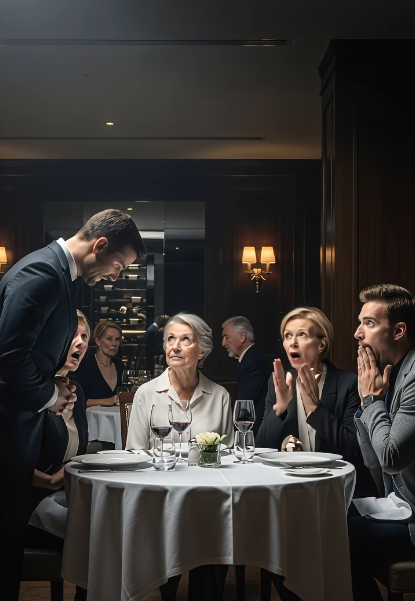Let me tell you who I really am. Because my son Marcus, at thirty-five years old, never knew the truth about his mother. To him, I was always just the woman who left early for the office and came back tired, who cooked with whatever was in the fridge. Just another employee, maybe a secretary, someone ordinary.
I never corrected him. I never told him that I earned forty thousand dollars every month, that I had been a senior executive at a multinational corporation for almost twenty years, signing million-dollar contracts and making decisions that affected thousands of people. Why would I? Money was never a trophy I needed to hang on the wall. I grew up in an era where dignity was carried within, where silence was worth more than hollow words.
So, I guarded my truth. I lived in the same modest apartment for years. I used the same leather handbag until it was worn out. I bought clothes at discount chains, cooked at home, and saved everything. I invested everything and became wealthy in silence. Because true power doesn’t shout; it observes.
And I was observing closely when Marcus called me that Tuesday afternoon. His voice sounded different, nervous, like when he was a kid and had done something wrong.
“Mom, I need to ask you a favor. Simone‘s parents are visiting from overseas. It’s their first time here. They want to meet you. We’re having dinner on Saturday at a restaurant. Please come.”
Something in his tone made me uncomfortable. It wasn’t the voice of a son inviting his mother; it was the voice of someone asking not to be embarrassed.
“Do they know anything about me?” I asked calmly.
There was a silence. Then Marcus stammered, “I… I told them you work in an office, that you live alone, that you’re… simple. That you don’t have much.”
There it was. Simple. As if my entire life could be contained in that miserable adjective. As if I were a problem he needed to apologize for. I took a deep breath. “Okay, Marcus. I’ll be there.”
At that moment, I decided that if my son thought I was a poor woman, if his wife’s parents were coming ready to judge, then I would give them exactly what they expected. I would pretend to be broke, naive, and desperate. A mother barely surviving. I wanted to feel firsthand how they treated someone who had nothing. I wanted to see their true faces, because I suspected Simone and her family were the type of people who measured others by their bank accounts. And my instinct never fails.
Saturday arrived. I dressed in the worst outfit I owned: a light gray, shapeless, wrinkled dress from a thrift store. Old, worn-out shoes, no jewelry, not even a watch. I grabbed a faded canvas tote bag, pulled my hair back into a messy ponytail, and looked in the mirror. I looked like a woman broken by life. Forgettable. Perfect.
I took a taxi to the restaurant, a high-end establishment in the most exclusive part of the city, the kind where the menu doesn’t list prices. As we drove, I felt a mix of anticipation and sadness. Sadness because a part of me still hoped I was wrong, that they would look past the old clothes and treat me with kindness. But the other part, the one that had worked for forty years among corporate sharks, knew exactly what was waiting for me.
I crossed the threshold, and there they were. Marcus stood next to a long table, looking anxious. Beside him was Simone, my daughter-in-law, in a tailored cream dress. She wasn’t looking at me; she was looking towards the entrance with a tense, almost embarrassed expression.
And then I saw them: Simone’s parents, seated like royalty on their thrones. The mother, Veronica, wore a fitted emerald-green dress full of sequins, jewels dripping from her neck, wrists, and fingers. Beside her was Franklin, her husband, in an immaculate gray suit, a giant watch on his wrist. They looked like they had stepped out of a luxury magazine.
I walked toward them slowly, with short, timid steps. Marcus saw me first, and his face fell. He looked me up and down. I noticed him swallow hard.
“Mom,” he said, his voice strained. “You said you’d come.”
“Of course, son. Here I am,” I smiled, the smile of a woman unaccustomed to such places.
Simone greeted me with a quick, cold kiss on the cheek. “Mother-in-law, it’s nice to see you.” Her eyes said the opposite. She introduced me to her parents in an almost apologetic tone. “Dad, Mom, this is Marcus’s mother, Alara.”
Veronica looked up, studied me, and in that instant, I saw it all: the judgment, the disdain, the disappointment. Her eyes scanned my wrinkled dress, my old shoes, my canvas tote. She extended a hand—cold, quick, and weak. “A pleasure.”
Franklin did the same. A weak handshake, a false smile. “Charmed.”
I sat in the chair at the end of the table, the one furthest from them. No one helped me pull it out. No one asked if I was comfortable. The waiter arrived with the elegant menus, and I opened mine, pretending not to understand anything.
Veronica watched me. “Do you need help with the menu?” she asked, a smile not reaching her eyes.
“Yes, please,” I said, my voice small. “I don’t know what these words mean.”
She sighed and ordered for me. “Something simple,” she said to the waiter. “Something that doesn’t cost too much. We don’t want to overdo it.”
The phrase hung in the air. Franklin nodded. Marcus looked away. No one said anything.
Veronica started the conversation, subtly steering it toward money. She mentioned their thousand-dollar-a-night hotel, the luxury car they’d rented, the “few thousand” they’d spent shopping that day. She spoke while looking at me, expecting me to be impressed. I just nodded.
“How nice,” I said.
“And you, Alara,” she continued, her tone sweet but venomous, “what exactly do you do?”
“I work in an office,” I replied, lowering my gaze. “I do a little bit of everything. Paperwork, filing… simple things.”
Veronica exchanged a look with Franklin. “Ah, I see. Administrative work. That’s fine. It’s honest. All jobs are dignified, right?”
The food arrived—enormous plates with tiny, artfully decorated portions. Veronica cut her steak with precision. “This costs eighty dollars,” she said. “But it’s worth it. Quality is worth paying for, isn’t it?”
She then turned her questions to my life. “It must be difficult, isn’t it, Alara, living alone at your age without much support? Does your salary cover everything?”
The trap was closing in. I barely replied, “But I manage. I save where I can. I don’t need much.”
Veronica sighed dramatically. “Oh, Alara, you are so brave. Truly. Although, of course, one always wishes to give our children more, to give them a better life. But oh well, everyone gives what they can.”
There it was, the subtle but deadly blow. She was telling me I hadn’t been enough for my son.
“We always made sure Simone had the best,” she continued. “The best schools, world travel, four languages. When she married Marcus, well, we helped them quite a bit. We gave them money for the down payment on the house. We paid for their honeymoon. And you,” she looked at me intently, “were you able to help Marcus with anything when they got married?”
The question floated like a sharp knife. “Not much,” I replied. “I gave them what I could. A small gift.”
Veronica smiled. “How sweet. The intention is what’s important.”
Right then, a cold, controlled rage began to stir within me. I breathed slowly, kept my timid smile, and let her keep talking. The more she talked, the more she revealed the emptiness inside.
Veronica swirled a two-hundred-dollar-a-bottle wine in her glass. “When you know quality, you don’t skimp. Do you drink wine, Alara?”
“Only on special occasions,” I replied. “And usually the cheapest one.”
She smiled condescendingly. “Oh, don’t worry. Not everyone has a trained palate.”
After dessert, Veronica’s expression turned serious, falsely maternal. “Alara, I understand you did the best you could with Marcus. But now he is at another stage in his life. He is married, he has responsibilities, and, well, Simone and he deserve to have stability.”
“Stability?” I asked softly.
“Yes,” Veronica replied. “Financial, emotional stability. We have helped a lot, but we also believe it’s important that Marcus doesn’t have… unnecessary burdens.”
Her tone was clear. She was calling me a burden.
“I don’t want to sound harsh, Alara, but at your age, with a limited salary, it’s natural for Marcus to worry about you. We don’t want that worry to affect his marriage. Do you understand?”
“Perfectly,” I replied.
Veronica smiled. “I’m glad. That’s why we wanted to talk to you. Franklin and I have thought about something. We could help you financially, give you a small monthly allowance, something that allows you to live more comfortably. Obviously, it would be modest.”
I remained silent, waiting.
She continued, “And in exchange, we would only ask you to respect Marcus and Simone’s space. Not to seek them out so much. To give them the freedom to build their life together without interference. How does that sound?”
There it was: the bribe, disguised as charity. They wanted to pay me to disappear from my son’s life so I wouldn’t embarrass their precious daughter with my poverty.
Marcus exploded. “Mom, that’s enough! You don’t have to—”
Veronica interrupted him. “Marcus, calm down. We’re talking like adults.”
I picked up my napkin, calmly wiped my lips, took a sip of water, and let the silence grow. Then I spoke. My voice was no longer timid or small. It was firm, clear, and cold.
“That’s an interesting offer, Veronica. Truly very generous of you.”
She smiled victoriously. “I’m glad you see it that way.”
“But I have a few questions,” I said, leaning forward slightly. “How much exactly would you consider a ‘modest’ monthly allowance?”
Veronica hesitated. “Well, we were thinking about five hundred dollars, maybe seven hundred.”
“I see. Seven hundred dollars a month for me to disappear from my son’s life.”
Veronica frowned. “I wouldn’t put it like that…”
“That is exactly how you put it,” I responded. “And the forty-thousand-dollar down payment, the fifteen-thousand-dollar honeymoon… you’ve invested about fifty-five thousand dollars in them. Tell me, Veronica, all that investment, did it buy you anything? Did it buy you respect? Or did it just buy obedience?”
The atmosphere changed. Veronica stopped smiling. “Excuse me?”
My tone became sharper. “You’ve spent the entire night talking about money. But you haven’t asked even once how I am, if I’m happy, if I need company. You have only calculated my worth, and apparently, I’m worth seven hundred dollars a month.”
Veronica paled. “I didn’t…”
“Yes, you did,” I interrupted. “And do you know what I discovered, Veronica? The people who only talk about money are the ones who least understand its true value.”
I placed my napkin on the table and leaned back in my chair. There was no more timidity in my posture. “Veronica, have you ever struggled alone? Have you ever built something with your own two hands, without your family’s money?”
She stammered, “I manage our investments…”
“Businesses your husband built,” I countered. “Properties you bought together. There’s a difference between managing money that already exists and creating it from scratch.” I paused, letting my words sink in. “Forty years ago, I was twenty-three. I was a secretary, earning minimum wage. I got pregnant. The father disappeared. My family turned their backs on me. I chose to keep going. I worked twelve hours a day while raising a child alone. I studied at night. I learned English at the public library. I learned finance, administration. I climbed up, little by little, from secretary to assistant, to coordinator, to manager, to director. It took me twenty years of non-stop work, of sacrifices you can’t even imagine. But I did it. And do you know how much I earn now?”
Veronica shook her head.
“Forty thousand dollars a month.”
The silence was absolute. Marcus dropped his fork. Simone’s eyes went wide. Veronica froze, her mouth slightly open.
“Forty thousand,” I repeated. “Every month, for almost twenty years. I am the Regional Director of Operations for a multinational corporation. I oversee five countries. I manage budgets of hundreds of millions of dollars. I make decisions that affect more than ten thousand employees.”
Marcus was pale. “Mom, why did you never tell me?”
“Because you didn’t need to know, son. Because I wanted you to grow up valuing effort, not money. Because true wealth isn’t shown off.” I looked at Veronica. “That’s why I came dressed like this tonight. I wanted to see how you would treat me if you thought I had nothing. I wanted to see your true colors. And boy, did I see them.”
Veronica was red with shame and humiliation. “This is ridiculous! If you earned so much, we would know!”
“Why would you?” I replied. “The money I earn, I invest. I save. I multiply. I don’t spend it on flashy jewelry or showing off in expensive restaurants.”
I stood up. “Let me tell you something no one has ever told you. Money does not buy class. It does not buy empathy. You have money, perhaps a lot, but you don’t have an ounce of what truly matters.”
Veronica stood, furious. “And you do? You who lied, who deceived us!”
“I didn’t make you look like fools,” I replied coldly. “You took care of that all on your own. I just gave you the opportunity to show who you are.”
Simone had tears in her eyes. “Mother-in-law, I didn’t know…”
“I know,” I interrupted. “But your parents knew exactly what they were doing. They knew they were humiliating me, and they enjoyed it.”
I looked at Veronica one last time. “You offered to help me with seven hundred dollars a month. Let me make you a counteroffer. I will give you one million dollars, right now, if you can prove to me that you ever treated someone kindly who didn’t have money.”
Veronica opened her mouth, then closed it. She said nothing.
“Exactly,” I replied. “To you, people are only worth what they have in the bank. I built wealth; you just spend it. I earned respect; you buy it. I have dignity; you have bank accounts.”
I picked up my old canvas tote, pulled out a black platinum credit card, and dropped it on the table. “This is my corporate card. Unlimited limit. Pay for the dinner with a generous tip. Consider it a gift from a broke and naive mother.”
Veronica looked at the card as if it were a poisonous snake. Black, shiny, with my name engraved in silver: ALARA STERLING, REGIONAL DIRECTOR. Her hand trembled.
The waiter returned. “Sir, your card was declined,” he said to Franklin. Franklin turned red. He tried another card. Also declined. He stormed out of the restaurant to call his bank.
“This has never happened to us,” Veronica murmured, humiliated.
I took out my personal wallet and produced another card, this one a transparent, heavy metal. A card that less than one percent of the world’s population possesses.
Veronica’s eyes widened. She recognized it. “That’s a Centurion card.”
“That’s right,” I replied. I handed it to the waiter, who returned in less than two minutes.
“Thank you, Miss Sterling. Everything is settled.”
I stood up. “The dinner was delicious. Thank you for showing me exactly who you are. You saved me a lot of time.” I looked at Simone, who was sobbing. “You are not to blame for how your parents are,” I said softly. “But you do choose how you act. Learn that money does not define people.”
I walked to the exit, Marcus beside me. I stopped and turned one last time. “Ah, Veronica, one more thing. You said you speak four languages. In which of those did you learn to be kind? Because clearly, it wasn’t in any of them.”
Outside, I felt a huge weight lift from me. I had spoken my truth. I had set my boundaries. I had protected my peace. And for the first time in a long time, I didn’t have to pretend who I was. I was simply Alara. Mother, executive, woman, survivor. Rich in every sense that truly mattered. And that was more than enough. It was everything.






